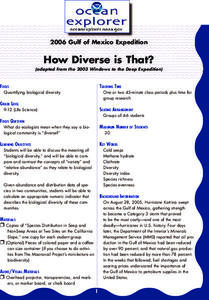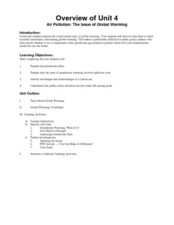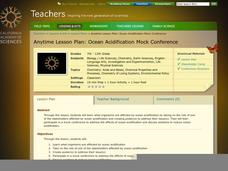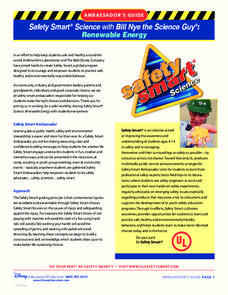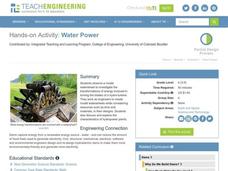EduGAINs
Go Eco! Ecosystems
How is a movie theater like a desert biome? Compare systems to ecosystems with a set of activities that focuses on accessing multiple intelligences and building upon knowledge. As learners discuss the ways elements of an ecosystem depend...
Population Connection
A Demographically Divided World
Did you know that birth and life rates vary across the world? The resource, the second in a six-part series, discusses just how demographics differ across countries and why it might be the case. Scholars complete worksheets, watch...
British Council
Plastic-Free Is Not Easy
Paper or plastic? Scholars discuss a worksheet containing grocery photos in which consumers were challenged to buy items without plastic wrapping or containers. Learners rank the food items by the need for packaging, such as a banana,...
Curated OER
The Marvels of Mud
Young scientists roll up their sleeves and get a little dirty in this three-day earth science investigation. Following the scientific method, children monitor the growth of algae in pond water samples in order to determine the role that...
Curated OER
How Diverse is That?
After reviewing biodiversity, learners work in small groups to analyze actual species distribution data. They learn to calculate the Shannon-Weaver diversity index for different communities. Though not particularly engaging, the content...
Curated OER
Recycle Relay
Here is a quick activity intended to get little learners ready to conserve. They classify trash for recycling by placing items in the categories reduce, recycle and reuse. In teams the sort real life trash items into the best...
Curated OER
Top to Bottom
Marine science classes read about the 2005 North Atlantic Stepping Stones Expedition and review climate change. They use maps to locate the seamount chains. In collaborative groups, they research how climate change may be altering the...
Curated OER
Treasures in Jeopardy
In small groups, middle schoolers research deep-sea coral reefs and design a poster to educate the public about their importance. They compare them to shallow-water reefs and consider the impact of bottom-trawl fishing. Many internet...
Captain Planet Foundation
George Washington Carver and the Sweet Potato
Learn about George Washington Carver's important contributions to agriculture by studying the sweet potato. First graders read about the inventor's observations and prepare sweet potato slips for the class garden. Additionally, they...
Kenan Fellows
Sustainability: Learning for a Lifetime – Soil
Do great gardeners really have green thumbs—or just really great soil? Environmental scholars discover what makes Earth's soil and soil quality so important through research and experimentation. Learners also develop an understanding of...
Curated OER
The Extinction and Rediscovery of the Ivory-Billed Woodpecker
An incredibly thorough, and well-designed lesson teaches youngsters about the presumed extinction and rediscovery of the ivory-billed woodpecker in Arkansas. Learners discuss the environmental factors that led to the birds disappearance....
Curated OER
Air Pollution: The Issue of Global Warming
Here is an outstanding 10-page lesson plan on global warming. Learners discover that there is a lot of controversy surrounding this topic in that the science behind global warming is difficult to prove. The best thing about this plan is...
California Academy of Science
Ocean Acidification Mock Conference
In a comprehensive role playing activity, teens play the parts of different stakeholders in the realm of acidic oceans. They research, debate, and create a presentation from the perspective of either ocean organisms, the fishing...
Habitat Conservation Trust Foundation
Greenhouse Gas Game
You will need to gather a number of tokens, bags, and other various game components in order to incorporate this activity into your curriculum. Different tokens represent carbon dioxide, methane, and nitrous oxide. Printable 8.5"x11"...
Michigan State University
Bug Lyphe!
Introduce ecology classes to biodiversity and interdependence in ecosystems with a PowerPoint presentation. Then, they get up-close and personal with the invertebrate world by collecting insects, classifying them, and graphing their...
Curated OER
Empty Oceans
In groups of four, pupils brainstorm about seafood. They view the Monterey Bay Aquarium Seafood Watch website to examine the problems caused by the seafood industry. Learners are then brought back together to discuss what they...
Energy for Keeps
The Energy Times
Extra! Extra! Read all about past and present energy use in a classroom-made historical newspaper. Useful as a cross-curricular assignment between science, history, and language arts, the project is sure to get young journalists...
Consortium for Ocean Science Exploration and Engagement (COSEE)
One Ocean: It Matters!
Here is the first of four poignant lessons on how humans and oceans interact, even if people live far from the coast. This particular lesson also examines studies that are taking place in Antarctica of how climate change is affecting the...
Disney
Renewable Energy
Bring some energy to your physical science curriculum with this engaging Bill Nye the Science Guy lesson. Based on his Renewable Energy video, students explore the concepts of potential and kinetic energy and learn how they are applied...
Teach Engineering
Water Power
Young hydrologists observe a waterwheel which helps them investigate the transformations of energy that occur when the blades of a hydro-turbine are turning. They work together in pairs and pretend to be engineers who are building a new...
Cornell University
Bacteria Take Over and Down
Bacteria outnumber all other forms of life on Earth. Scholars observe the growth of bacteria in petri dishes to understand their role in maintaining good health. Then, they observe the growth of bacteria after they introduce...
NOAA
Biological Oceanographic Investigations – Signals from the Deep
The Deepwater Horizon oil spill directly impacted an area of the Gulf of Mexico the size of Oklahoma. A marine biology lesson looks at the impact of an oil spill on the deeper parts of the ocean. Scholars download actual data collected...
Kenan Fellows
Terrarium in a Bottle: Modeling the Atmosphere, Greenhouse Effect, and Water Cycle
You've heard of farm to table ... but what about farm in classroom? Junior agriculturalists embark upon a two-week journey into the science of growing things. Based upon the classic terrarium in a two-liter experiment, the lesson goes...
Curated OER
Wetland vs. Stream Macroinvertebrates
A link to a comprehensive macroinvertebrate guide gives you the information needed to prepare for this field study activity. Sample macroinvertebrates are collected from areas representing different environmental conditions. Junior...






